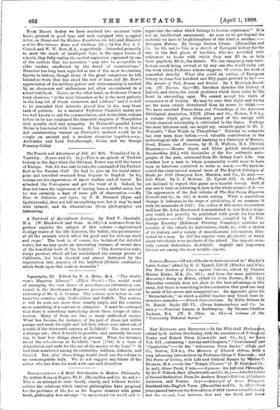llisciatANsous. — A Brief Introduction to Modern Philosophy. By Arthur Benson Rogers,
Ph.D. (Macmillan and Co. 6s. net.)— This is an attempt to state briefly, clearly, and without techni- calities the solutions which various philosophies have proposed for the problems of life, for, as Dr. Rogers observes with great truth, philosophy does attempt " to understand the world and to appreciate the value which belongs to human experience." It is not an intellectual amusement. As soon, .83 we get beyond the
material we have to be philOsOplieri of bile.kind or another.--_—
European History. By George Burton Adams. (Macmillan and Co. 6s. 6d. net.)—This is a sketch of European history for the
use, in the first place, of teachers, who are provided with references to books with which they may fill in, or help their pupils to fill in, the details. We can imagine a very satisn factory result being arrived at by any one who would carry out the work which Professor Adams suggests. Of course, the work is . somewhat sketchy. What else could an outline of European history in some four hundred and fifty pages pretend to be
The Annals of Toil, Roman and British. By J. Morrison David- son. (W. Reeves. 6s.)—Mr. Davidson sketches the history of
Labour, and states the social problems Which have come to the front in succeeding ages. We cannot accept his views of economics or of history. He may be sure that right and wrong are far more evenly distributed than he seems to think.
We have received Transantions and Proceedings of the American Philological Association, XXIX. (Ginn and Co., Boston, U.S.A.), a volume which gives abundant proof of the energy with
which classical scholarship is cultivated in the States. Perhaps the moat laborious and, one might say, valuable paper is Dr. J.
Wolcott's "New Words in Thucydides." Nothing so complete
has ever been done before.—A valuable contribution to the archmological side of classical learning is a Catalogue of Bronze:, Greek, Roman, and Etruscan, by H. B. Walters, M.A. (British Museum.)—Messrs. Smith and Elder publish Shakespeare's Handwriting (6d.), with facsimiles of the five authentic auto:.
graphs of the poet, extracted from Mr. Sidney Lee's Life. One wonders how a man to whom penmanship would seem to have been so laborious contrived to write so much.—We have re-
ceived the sixty-second annual issue of The English Catalogue of Books for 1898 (Sampson Low, Marston, and Co., 5s. net).— Solo Whist. By C. J. Melrose. (L. Upcott Gill. 3s. 6d.)—We
are inclined to regard this game as a baneful heresy. Still; if
any one is bent on following it, here is the whole science of it -- The appearance of the first volume of The New Penny Magazine
(Cassell and Co., 2s. 6d.) is worth noting. What a marvellous change it indicates in the ways cs! publishing, if we compare it with its namesake of 1932 ! The writer of this notice remembers well how Mr. John Blackwood demonstrated to hinithat a Maga-
zine could not possibly be published with profit for less than half-a-crown.—The Trinidad Reviewer, compiled by T. Fitz- George Eversley (Robinson Printing Company), contains an account of the island, its institutions, trade, &c., with a sketch of its history, and a variety of miscellaneous information, illus• trated by a map. In 1897 the exports were X1,994,921.1, of which about two-thirds were products of the island. 'f he imports were; with certain deductions, £1,852,537. Asphalt and Angostura bitters are among the most notable exports.






































 Previous page
Previous page